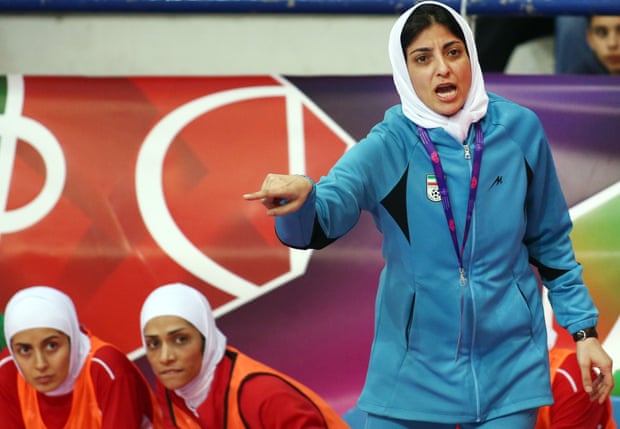Shahrzad Mozafar: Iran’s female futsal trailblazer who defied the odds

The Guardian – LONDON, Story of how a sport-crazy girl led her country to futsal glory and became a role model is told in this extract from a new book.
To her parents, it was no great surprise. When Shahrzad Mozafar was not kicking a ball with her sisters in their sun-baked family garden nestled in a parched neighbourhood in Khuzestan province, Iran, she was usually inside, dreaming about the love of her life. Football. An avid viewer of games on television – “I loved to be a coach since I was a kid” – on one occasion she indulged her fantasies by commentating on an imaginary match, capturing every word of a dramatic monologue on a cassette tape.
It was an outlet for a sport-crazy girl who turned eight at the height of the 1978–79 revolution, where newly introduced modesty laws made public sporting activity increasingly difficult for millions of women.
“When my father listened, he loved it,” says Mozafar, nearly four decades on. Her parents kept the tape for years, eagerly playing it for visitors. Their support fanned the flames of her clandestine love affair with football – one that led to a transformative career in futsal that elevates Mozafar as a 21st-century role model for women in the Islamic world.
After blazing a trail coaching the first Iran women’s football team – “being pioneer of anything that didn’t exist before is not easy” – she led the nation’s futsal team to a second Asian Football Confederation (AFC) women’s title in 2018.
The controversy accompanying the first title three years earlier, with her predecessor, Forouzan Soleimani, at the helm, exposed the distance still to travel on the road to equality for women in Iran. The inspirational captain – Niloufar Ardalan, AKA “Lady Goal” – missed the tournament after her husband refused to allow her to travel, insisting she stayed at home to accompany their seven-year-old son on his first day at school. Ardalan’s teammates rallied in her honour, triumphing in adversity as the outstanding Fereshteh Karimi shone in Ardalan’s No 7 shirt.
Shortly after Mozafar’s team retained the title, punitive economic sanctions imposed by the new US president Donald Trump hit Iranian sport hard, triggering an exodus that included Mozafar moving to Kuwait as the women’s national futsal team head coach.
In 2019, she sat proudly as the only female coaching instructor in Fifa and the AFC, championing the cause of the women’s game from within.
Her life charts the course of sporting history in a country synonymous with clashes between faith and culture. And her journey also highlights the specific role of futsal – the Fifa-sanctioned five-a-side indoor game – in the stubborn rise of women’s sport in the wider Muslim world.
For Mozafar, the resistance she symbolises started early. “The passion was born with me,” she says. “I have been looking for a ball my whole life. I can remember watching the World Cup in 1982 in Spain. I cried all night when Brazil lost against Italy.”
She was not alone. A more collective form of defiance dismantled a huge barrier to women in 1993, a little over a decade after the political earthquake had deposed the Shah. The gamechangers were the sport-mad students at Alzahra University in Tehran, the only all-female university in the country. With a soaring number of women becoming educated in the Islamic republic, the students compelled the university’s administrators to allow a groundbreaking unofficial futsal tournament that attracted nine other college teams.
It was nothing short of a cultural revolution. Just like Mozafar, many of the women had the game snatched from them as children after the early 1970s had brought girls on to the streets playing alongside boys. The Alzahra students decided enough was enough.
By 1997, the powerful Physical Education Organisation had formed a futsal committee that eventually sanctioned an official women’s universities futsal competition involving more than 100 students in 12 teams.
“For authorities, futsal was a palatable solution for women,” writes Timothy F Grainey in his book Beyond Bend it Like Beckham: The Global Phenomenon of Women’s Soccer. “They could play in an indoor facility where men could easily be locked out. In this way university officials and players were not contravening sharia law.”
For Mozafar, it’s been a lifetime of overcoming obstacles in a nation where football and futsal were forbidden to her from the age of eight to 28.
Her experience of Iran’s national pastime of street football, gol koochik, which means small goal in Persian, brought despair and hope in equal measure. The revolution stopped her playing, but it did not halt gol koochik. “Many boys were playing,” she says. “In that time the big cities in Iran were not too crowded. They made a goal with bricks or stones and sometimes used parked cars as a goal. If the ball went under the car, it was goal.
“The plastic ball they used to play was made for children … it was a toy, actually. So because it was very light, they cut it with a knife to make a slot then they put another one inside to make it heavy and call it two-layers ball. They would play two-v-two, three-v-three, four-v-four, etc. They had lots of spectators, including me.”
Watching wasn’t enough though. She craved playing. And once her family relocated to Tehran for safety at the height of the war, she found an outlet – and another haven – in volleyball. After representing the national team for a decade from age 18, she quit volleyball once futsal had taken off in earnest – while fully aware that, at 29, she was too old to start a new life as a player.
Coaching beckoned. In the early 2000s – “we had no football yet, just futsal” – she immersed herself in tactics as head coach with various clubs while assisting the coach for the new national women’s futsal team.
At this time, the Iran men’s team were busy earning the “kings of Asian futsal” tag by securing victory in the inaugural AFC tournament in 1999 – the first of seven consecutive titles.
In 2005, Mozafar was approaching her own crossroads. Khadejeh Sepanji, head of women’s football in the Iran Football Federation, invited her to lead the new national football team at the West Asian Football Games. “I was 35, with no football coaching background and there was no football league,” says Mozafar. “In other words, we didn’t have any football players.”
With just weeks to put together a squad, she followed her instincts and recruited futsal players. “They couldn’t even make long and high passes because they had never played on grass before,” she says. But they made it to the Games, finishing runners-up behind the hosts, Jordan.
“This was the beginning of the road of football in my country,” she says. During the next five years, she combined club futsal with national football duties before being ordered to choose between the two sports by the federation. It was not a difficult decision.
“Iran was a pioneer in futsal in Asia,” she says, whereas in football it was lagging behind its Asian rivals. “So I decided to focus on futsal and let my dreams come true through it.”




